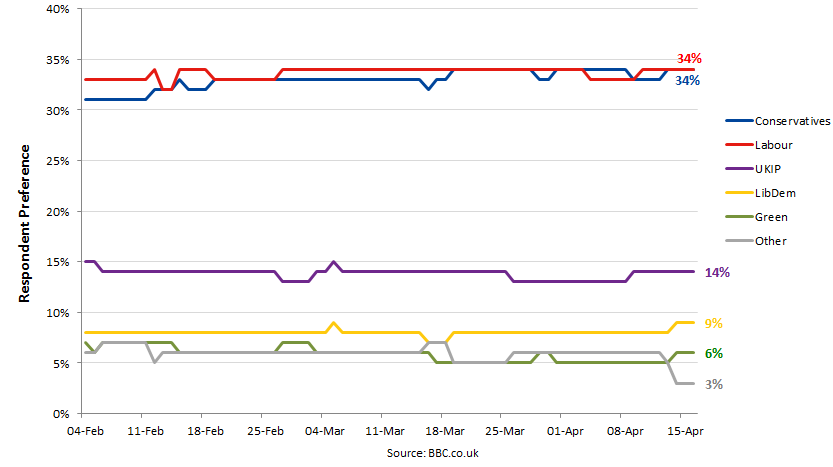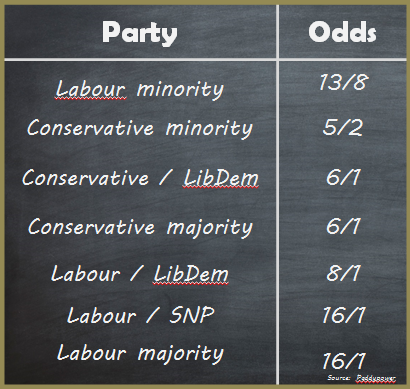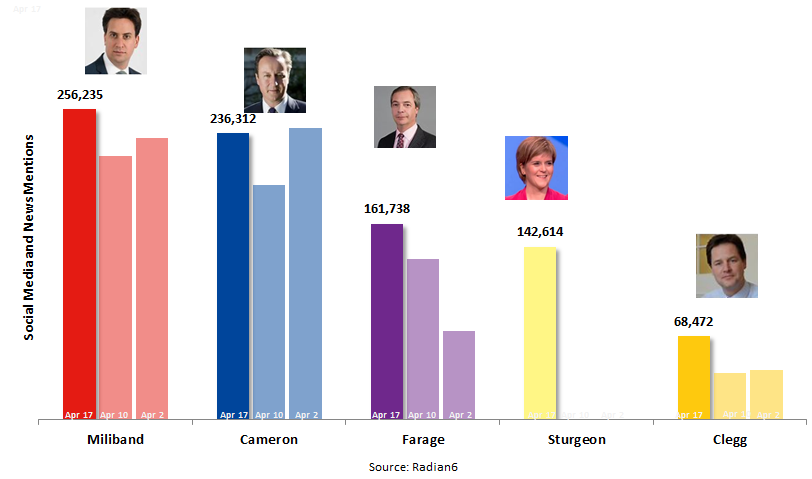FH Poll Position - Week Three
| Welcome to the third edition of FH POLL POSITION, your weekly email update from FleishmanHillard’s Public Affairs team in London. |
| POLL OF POLLSWeek three of the short campaign is almost over, and there still does not appear to be any clear breakthrough for either the Conservatives or Labour.The two largest parties in the UK have made their main pitches, through their manifestos, and the set pieces of the TV debates have come and gone. In terms of single events likely to feature on the most amount of people’s radars, this was the time to shine.Yet, according to the polls, the stars of Cameron and Miliband seem to be a little dull, with their campaigns lacking the sparkle to lead enough people to put an x in their box come May 7th. Britain is heading for another coalition, the makeup of which is still highly uncertain. Ed Miliband has had a good few weeks, with Labour widely seen to be running a competent and effective campaign. However, the risk remains that he will yet not get enough seats to avoid having to resort to a partnership with the SNP. On the other hand, although the Conservative Party manifesto contained some tempting gifts for their faithful followers, it is far from clear that this had any wider appeal.
If the polls show anything, it is that the Liberal Democrats appear to have sacrificed themselves for the greater good, heamorrhaging support in their South West heartlands – it may take an act of God to resuscitate the Lib Dem campaign. But miracles do happen! ODDS ON Interestingly, the shortest odds are for a minority government, which perhaps flies in the face of perceived wisdom. David Cameron has spoken openly about the possibility of him leading a minority Conservative government before, but whether this would provide the stability needed is another question. Perhaps what this shows is that a coalition with anyone but the Liberal Democrats is not favoured, as that would also not provide the long term stability needed for effective government. The one problem with this, and which is at odds with the polling, is that it looks like the Lib Dem will not have enough seats for either Labour or the Conservatives, requiring an arrangement with yet another party (or more) to reach an outright majority. It is also worth noting that a Conservative majority is still considerably more likely, according to this, than a Labour majority is. Some small comfort to any optimistic Conservative! DIVIDING LINE OF THE WEEK This week the dividing line is less of a clear line and more like a smudge – a general summary of what the Liberal Democrat manifesto, and the policies contained therein, is. Like the other main parties, they launched their manifesto this week, with the broad feeling being that it was neither one thing nor t’other, but instead was focused on positioning the party as the compromise candidate, somewhere between Labour and the Conservatives. The Liberal Democrats have a reasonable expectation that they might continue in Government after the election, regardless of who the Prime Minister is – so they clearly did not want to make too many enemies. Clegg openly admitted that only David Cameron or Ed Miliband would end up as Prime Minister, and claims to be the moderating force for either. Like something out of the Wizard of Oz, Clegg promised to give ‘a heart to a Conservative government and a brain to a Labour one’ – and then offered this as a contrasting, more appealing, picture to one in which either the Conservatives are propped up by UKIP to the right, or Labour to the left by the SNP. LEADER-O-METRE In the aftermath of the ‘Challengers Debate’, Ed Miliband is perhaps beginning to nudge ahead of David Cameron. A Survation poll following the debate put Miliband in the lead for the Prime Ministerial contest for the first time, scoring 45% compared to Cameron’s 40%. Whether it was a good decision or not for Cameron to opt out of the last TV debate is arguable. All five leaders attacked him for his absence – but we will never know what may have happened if he had put himself in the firing line. In light of heavily coordinated pressure from the three female leaders (whose spontaneous embrace is trending today) directed at Ed Miliband, perhaps it will turn out to be a shrewd move. Nicola Sturgeon delivered yet another strong performance. Contrary to what the post-debate polls seemed to suggest, the media declared Nicola ‘hammered’ Miliband, playing nicely into the Conservatives’ narrative of Miliband marching to her drumbeat. To the amusement of twitter followers across the country, Farage received a cold reception, followed by a scolding from David Dimbleby when he turned on the audience. Nevertheless, he came out on top as the third victor of the debate, suggesting the attack and his hard stance on defence and immigrants struck a chord with his core supporters. Only four million viewers tuned into BBC One’s election debate, which is two million less than the previous ITV and 1.2 million less than the amount of viewers who tuned in to watch the ITV soap Emmerdale, which aired at the same time. Nevertheless the #BBCdebate hashtag was used more than 400,000 times during the evening, unsurprisingly, making it the top trending topic of the night.
Monday saw the launch of the Labour manifesto in Manchester. In a performance that was widely viewed as competent, even statesmanlike, Miliband presented Labour’s manifesto – a dull and unoriginal document which contained nothing not seen before apart from an open-ended commitment to cut the deficit year-on-year, but without specifying by how much or what their ultimate target was. The deficit commitment was a clear attempt to tackle sceptics of Labour’s economic credentials head-on – however, in being so loosely phrased, it risked marring an otherwise slick performance which was more about exposing Miliband to the electorate than the detail of what they promised. However, the scorn the Institute for Fiscal Studies poured on Labour’s plans (“Literally, we would not know what we were voting for if we were going to vote for Labour”), appeared not to dent an otherwise successful manifesto launch event, which lined up a relatively successful week. In Swindon on Tuesday, the Conservatives attempted to jump-start a lacklustre campaign which had previously focused purely on the economy and leadership. In a statesmanlike performance which roamed across the international and domestic arena, Cameron unveiled a manifesto which attempt to offer a new, optimistic, vision for the future – and did so on the back of a series of largely uncosted policies on areas such as the NHS (£8bn extra funding by 2020), inheritance tax (increase the inheritance tax threshold for homes to £1m) and defence (maintain the armed forces at their current levels). Overall, this is a manifesto which will appeal to the activists, and Cameron turned in an effective performance. It was not obvious that this necessarily extended his appeal beyond those already likely to vote for him. On Wednesday, the Liberal Democrats launched their manifesto from a trendy warehouse in London. Weighing in at fully double the length of the other parties – 160 pages next to closer to 80 pages for both the Tories and Liberal Democrats – the Liberal Democrats have spent a lot of time delivering a document, very little of which is likely to be achieved. In a decent performance marred only by equipment failures and his refusal to take more than one question from the press, Clegg made an explicit a pitch to be the next coalition partner, a moderating hand on an otherwise excessively rightwing Tory Party, or a Labour Party with no sense of fiscal responsibility. Noting that no one was going to get an overall majority, Clegg painted the options as a Conservative-UKIP coalition, a Labour arrangement with the SNP, or a Liberal Democrat agreement with either. Revealing a previously unseen side, Clegg indulged his inner Judy Garland – offering a ‘heart’ to the Conservatives and a ‘brain’ to Labour. He set five broad priorities which would form the basis for any Liberal Democrat arrangement with either side – which were so loosely formulated as to ensure the bar for success is set much lower than last time. This was a worthy, serious attempt at delivering a prospectus for the next five years. The problem for the Liberal Democrats is whether anyone is listening. Also this week we saw the manifestos from the Greens and UKIP. Having already offered a leader who is capable of performances only the most credulous would buy, the Greens have clearly decided to double down and offer a manifesto in similar spirit. They appear to inhabit a slightly odd twilight world in which near-limitless sums of money can be extracted from places the other parties are either too stupid to spot or insufficiently bold/too capitalist to go after. Tax avoidance and rich people, in particular, appear to be regarded as piggy banks which can be raided at will ‘for the common good’. Consequently, in their own terms, all their policies were fully costed. Thankfully, as no one really believes they will be in a position to alter much after the election, the reality does not really matter. In similar spirit, UKIP offered a manifesto which majored on immigration, cutting international aid, and readjustment of the Barnett formula. In a nervy, sweaty, performance, Farage gave every impression of a man under some pressure – not helped when a question from the Telegraph’s Chris Hope triggered a near riot. UKIP are facing a declining market share, and, to judge by Farage’s recent performances (notably also at the television debate yesterday), are clearly deciding to focus on their base, holding what they have and turning it into seats. Their manifesto plays to this – without really trying to offer a serious programme for a Government which, realistically, they will not be involved in. 13 polls since the Independence Referendum: 5 have “Yes” winning, 1 has a tie, and the others have “No” winning. The Scottish nation is as divided as ever after the dramatic referendum last year, with the nation seemingly split down the middle. So what are the ramifications of this on the UK General Election? For a start, there’s some evidence of people on the ground wanting to vote tactically, in an effort to stop the Nationalists. The almost 50% support, according to the polls, for the SNP, shows the sometimes curious results of the UK electoral system. The support of half the voting public could lead to near domination of the Scottish seats in Westminster. Tactical voting is one way to counteract this, but the mainstream parties (with the exception of the desperate Lib Dems) are not doing a lot to help their beleaguered foot soldiers to coordinate this, leading to considerable confusion as to what the plan is. Amongst unionists there are significant numbers now who are less worried about being governed by Labour or the Tories, and more bothered about the constitutional future for Scotland – the question that everyone is asking being: who do I need to vote for to stop the Nationalists? If the main UK parties, and the Scottish electorate, do not want the trauma of another referendum in the near future, there needs to be some central coordination from the party leaderships, instead of blindly hoping the SNP will go away – they won’t! Thank you to Margaret Smith, Director of Edinburgh-based Caledonia Public Affairs – www.caledoniapa.com. FROM THE FRONT LINE Over the previous two editions we’ve focused this section on reactions to the ‘glamorous’ end of the front line, door knocking. But there’s another part of the campaign trail that’s equally important – the humble leafleting. The political parties spend thousands of pounds, if not millions, on newsletters, cards and general paraphernalia that depends on thousands of willing volunteers pounding the pavements: alone, wet, tired and with no personal interaction (at least that’s what many hope for). This week I find myself in a major city in the South West, full of hope for what would be a rewarding and worthwhile day of political interaction, discussion and debate. Rocking up to the local HQ I was greeted by one of the largest piles of newsletters you will ever see. It seems I will have to make do with dropping letters through the doors instead of engaging with people…..maybe they saw me coming. Handed a map and a bag (you’re too kind), that was it. Even though this was the place I went to University, I had no idea where this God-forsaken place was I was being sent off to on the outskirts of the city. Directions? No chance. Follow your nose and hope the 10% of iPhone battery will ensure the Satnav can get you to the right place. So, arriving at the street (yes, it was just one street, with 500 newsletters), I set to it. Below are a few things you should know about political leafleting: i) Number one has to be dogs. Who knew a ‘Beware of the Dog’ sign could strike so much fear into a grown human being. This is the one and only time you convince yourself to just chuck it through the letter box, hope it goes in and make sure you get your hands out before the barks getting ever closer from inside turn into a bite… ii) Bloodied hands. Not related to the dogs (hopefully). It may just be me but the amount of cuts on a hand after a good day’s leafleting is not even funny. Those letter boxes are dangerous things. iii) Opposition posters in windows. Deep breath. These are the only houses you don’t even bother putting anything through – what would be the point? So, you find yourself holding your breath as you walk/run straight past, hoping they haven’t seen you with your party-branded bag. Survived? Phew, move on. iv) Opposition leaflets still in the letterbox. Gold dust. Is it sad that this actually brings a smile to one’s face?! The first thing you learn when canvassing – if the other side have been stupid enough to not push their material through the letter box, respectfully and, with great grace, remove said item from the letterbox and replace with yours. Making sure to push it all the way through. You’re doing the poor residents a favour after all…… v) The back. Oh the back. I’m under 30 and my back is KILLING ME with all this bending down – how is that possible? All of this is topped off by the thought you have at the outset, throughout the dreary walk, and at the end. Absolutely no one is going to read this. No one. Why? Why? Why am I doing this? And this brings us to the purpose – leafleting is not about that, really. It’s about brand recognition. It’s about residents seeing your name, seeing your picture and seeing your party branding (in all cases apart from the Lib Dems). It’s a chance for your candidate to get through the front door and into people’s lives so that, come May 7th, they’ll recognise the name on the ballot box. And if your opposition hasn’t bothered with that particular house? So much the better. It’s a competition after all. HACKED OFF A mixed bag of lines, much like the week. “The only thing I missed, out on the road to cover the general election, was the general election.” – Philip Collins , The Times. “Nicola Surgeon has hijacked the 2015 election. Where she’s taking it is anyone’s guess.” – Dan Hodges, The Guardian. “The only certainty is that ‘white van man’, once parked on the hard shoulder of politics, is back in the driving seat on the road to power.” – Mary Riddell, Daily Telegraph DON’T FORGET Next week will see the start of a series where various ministers and their shadows argue it out on BBC 2’s Daily Politics. If you’re not doing anything interesting in the middle of the day, check it out. If you’re at work, you decide whether watching a bunch of politicians discussing policy is more entertaining than your your day job. You can follow us on our new election twitter channel @FHUKPolitics where some witty or insightful comment may be made. |
Find Out More
-
Platinum CMS Award
March 13, 2024
-
Changing Communications Tack at Mobile World Congress
February 21, 2024






